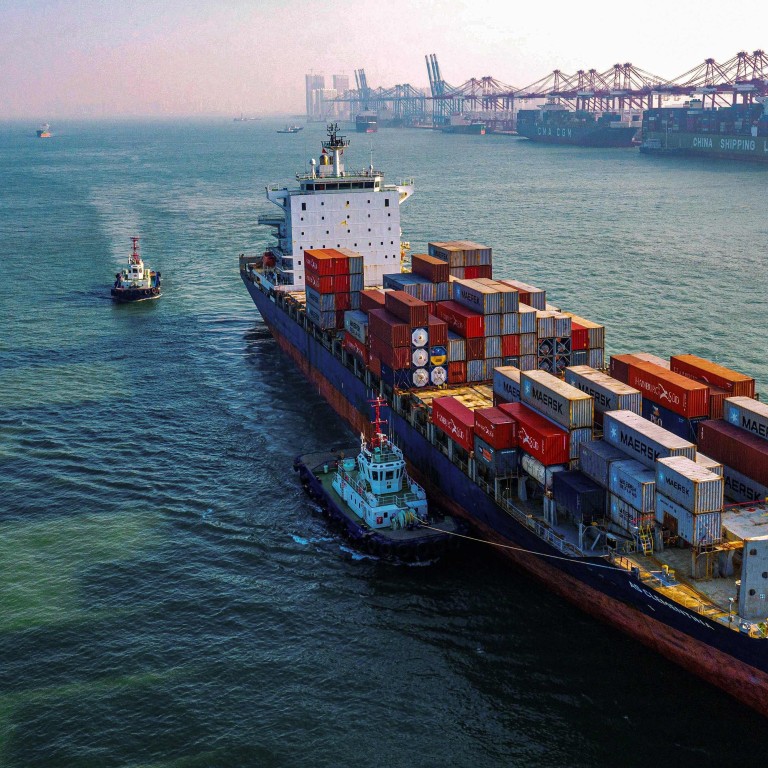
Coronavirus: China urged to delay purchase elements of US trade deal as outbreak rocks economy
- State-backed economists in Beijing warn coronavirus outbreak may restrict demand for purchases and urged China to request delay
- Large swathes of China on lockdown meaning trade has been hampered and logistics slowed to a snail’s pace
Beijing should request a delay in the purchase agreement element of its phase one trade deal with the United States, senior Chinese economists have said, due to the strain on its economy caused by the novel coronavirus outbreak.
His comments came amid mounting consensus among international trade economists that the disruption to China’s economy will be so great as to make it nigh on impossible to meet the lofty import demands.
“If possible, China should bring forward the request to postpone the implementation of purchase plan in an appropriate manner,” said Xu, who is also a senior fellow with the Chinese Academy of Social Sciences, another government think tank.
Xu’s suggestion reflects growing concerns among Beijing’s policy circle that the deadly virus could derail the world’s second largest economy in the first quarter of 2020, if not the whole year.
The death toll has risen to 1,772, while total confirmed cases had reached 70,639 by Monday, including more than 1,000 cases in the provinces of Guangdong and Zhejiang respectively, two manufacturing and export bases.
Logistics in China catering to internal and foreign trade have also been severely hampered, with a report by DHL saying that at the world’s busiest container port in Shanghai, only 50 per cent of stevedores are on duty.
“The purchases of US aircraft cannot be done in the short-run, as airlines have been hit hard and since the outbreak remains, Chinese demand for American machinery, electrical equipment and energy needs to be delayed as domestic production has not yet been fully resumed,” Xu wrote.
A passage in the deal’s text states that “in the event that a natural disaster or other unforeseeable event outside the control of the parties delays a party from timely complying with its obligations under this agreement, the parties shall consult with each other”.
In an email exchange with the South China Morning Post after the publication of the article on the China Finance 40 Forum website, Xu said that “it may be pretty hard even if both decide to negotiate over it”.
“However, I think China should bring it on the table first,” he said, adding that the crisis could provide an opportunity to enhance medical cooperation, while China could prioritise the purchase of American medical products.
I don’t know exactly what the Chinese have told the US, but everyone expects this [delay clause] and I do think the US will show some understanding.
However, a former Trump White House official – speaking on condition of anonymity – said: “I don’t know exactly what the Chinese have told the US, but everyone expects this [delay clause] and I do think the US will show some understanding.”
Huo Jianguo, former head of China’s Ministry of Commerce’s research institute, said both countries have the mechanism for monthly and quarterly reviews of the deal’s implementation. However, any delay would depend on negotiations with the US, rather than unilateral action from China.
“We need to first abide by the deal and strive to ensure its implementation,” he said. “It was not easy for such a deal was signed. We should try to prevent it from generating new disputes or even falling apart.”
“The US side should consider it because the economic impact on China is obvious in the short term. In reality, it will be difficult to buy American goods on a large scale,” he said. “There could be more gamesmanship between the two, and the US may bring out other demands in exchange [for the delay].”
Purchase the China AI Report 2020 brought to you by SCMP Research and enjoy a 20% discount (original price US$400). This 60-page all new intelligence report gives you first-hand insights and analysis into the latest industry developments and intelligence about China AI. Get exclusive access to our webinars for continuous learning, and interact with China AI executives in live Q&A. Offer valid until 31 March 2020.

